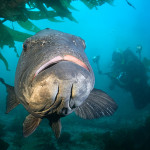Editor’s Note: This entry is written entirely by Brian Linton, the 22 year old President and founder of Sand Shack LLC. He reached out to us as a fan of what we were doing. After talking with him for a bit, I was impressed by his enthusiasm and how he has made ocean conservation and outreach a business plan. I was interested in his views on the symbiosis that business and conservation can take and asked if he would be interested in writing a short guest blog post. I am sure he will be willing to answer any further questions in the comments.
I am very interested in the role business can play in conservation efforts and would love to hear from anyone with a unique perspective on this. Contact me if you would like to contribute a guest post. – KAZ
————————————————————————————————————————————————————-

Growing up in Singapore I had the opportunity to travel to countless beaches and oceans around the world. I’ve seen the good, the bad, and the ugly. After realizing the enormous problems our oceans face I decided I would do something about it. I wanted to change the world, save the oceans, and preserve our beaches through the use of business. Hence, Sand Shack was born.
Since founding Sand Shack while still in college during the summer of 2006, it has grown into a prominent brand of ocean-friendly apparel and accessories with nearly 200 stores across the United States carrying our products. And despite the recession, we have seen tremendous growth in the last year.
Ocean Conservation As a Distinguishing Feature
Unlike many companies that associate themselves with an environmental mission, our focus on ocean conservation is not just an element of our company – it is the backbone. I realized early on that business was the perfect vessel to do a tremendous amount of good and change the world in which we live. Due to my upbringing and love for the ocean, ocean conservation was the obvious thing I wanted to build a business around.
In building my company I want to make sure that everyone who comes into contact with the brand knows about our mission. Sometimes I am so enthusiastic about introducing our company’s mission that the product becomes secondary. And with the recent increased media coverage of the issues associated with our oceans (most notably the trash “island” in the pacific) people are taking note to what we are doing.
Creative Capitalism is Good For Our Oceans
The truth of the matter is we are making money off of the oceans problems.
Hold on…
Before you crucify me let me explain how this works out for the good of the oceans.
Last year I read an article by Bill Gates on creative capitalism. In the article he made some good points, but the most important point he made was, basically, doing good is good for business. Creative capitalism is about using capitalism to build business while bettering the world. The companies who are sincerely working to solve our world’s problems end up benefiting from the associated publicity and good will of those who choose to buy their products.
Using the principals of creative capitalism, we have been able to leverage our mission for ocean conservation and grow our business. But we ARE doing real work, and for creative capitalism to work this is truly important – and being capitalist means that the more we grow, the more money we make, the more good we can do for our cause. I believe that a business is much more self sustaining and scalable than a non-profit group in the long run – and if used correctly, can contribute a tremendous amount to a needy cause.
What We Have Done and What we Are Doing
This past summer we hosted 3 events centered on building awareness for ocean conservation. Our biggest event was held in Stone Harbor, NJ on the Jersey Shore. The event, called Keep it Blue, was to educate children and families about the oceans eco-system. That day we had nearly 1000 people pass through the event, all leaving with a positive message about ocean conservation. In addition to all the ocean conservation events and beach cleanups we host we also donate 5% of our company proceeds to ocean conservation efforts outside our company.
We are still a small company, but as we grow I look forward to doing more and more good for our oceans. In running a business I meet a lot of people, and through these meetings I realize just how overlooked the problems associated with our oceans are. Sand Shack has given me the power and ability to communicate these issues on a platform I would not have without business.
In the end, I want to build a wildly successful business…and I want to change the world while doing it.
—
Written by Brian Linton.
Become a fan of Sand Shack on Facebook here: www.facebook.com/sandshack.
Get $5 off any order of $10 or more at Sand Shack when you enter “dsnrocks” in the coupon code box at checkout.
Share the post "An Inside Perspective on Integrating Ocean Conservation and Business"






Have to agree 100% about Brians post on monetizing the oceans. We posted something similar a while back. Too many conservation NGO’s look at monetization as a dirty word.
It is not.
If we are to have real and lasting conversations about ocean conservation the conversation must start at re-monitizing existing takes. Show a fishing fleet how to make money sustainably via tourism for example or via a direct consumer model.
http://sharkdivers.blogspot.com/2008/08/sharks-and-tourism-monetizing-is-not.html
Good luck, Brian. Hope you can make the difference that you want to. Kudos to you for coming up with new ideas.
Right on Patrick. Monetization is what can save our oceans. Thanks for the link to your interesting article and approach to monetization, love your blog!
Also, thanks Eric!